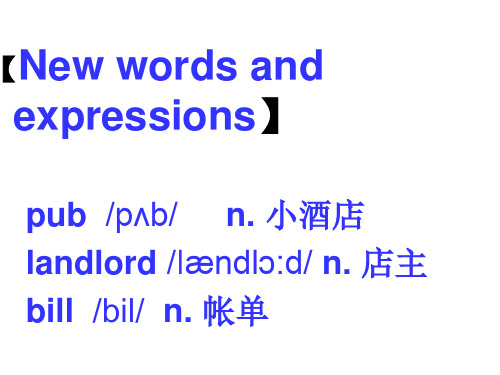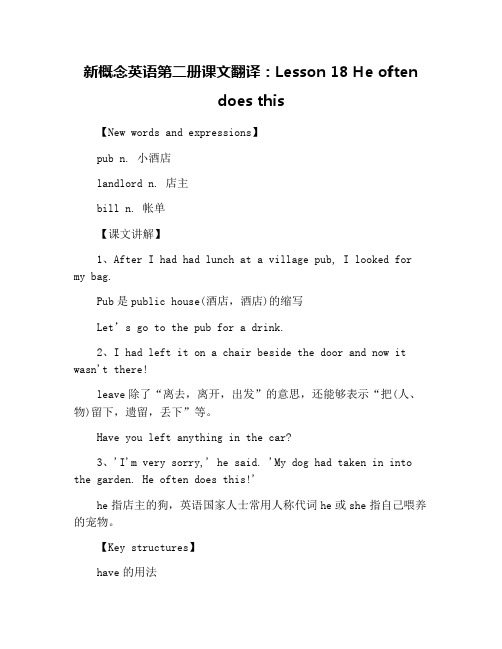新概念英语第二册Lesson18
- 格式:ppt
- 大小:6.07 MB
- 文档页数:46




新概念英语第二册课文翻译:Lesson 18 He oftendoes this【New words and expressions】pub n. 小酒店landlord n. 店主bill n. 帐单【课文讲解】1、After I had had lunch at a village pub, I looked for my bag.Pub是public house(酒店,酒店)的缩写Let’s go to the pub for a drink.2、I had left it on a chair beside the door and now it wasn't there!leave除了“离去,离开,出发”的意思,还能够表示“把(人、物)留下,遗留,丢下”等。
Have you left anything in the car?3、'I'm very sorry,' he said. 'My dog had taken in into the garden. He often does this!'he指店主的狗,英语国家人士常用人称代词he或she指自己喂养的宠物。
【Key structures】have的用法1、have作为助动词构成各种完成时和完成实行时2、have还能够作完全动词,当作“具有、拥有”讲时,它和have got通常能够互换。
have做“有, 患病” 概念时, 可作为实义动词, 也可作为非实义动词。
在英国英语中的疑问句和否定句中have(具有)的用法与be相同,即能够不用助动词do或did;在美国英语中,常用do助动词和have一起构成疑问句和否定句。
I don’t h ave a pen/a headache.I haven’t a pen /a headache.三种情况have 能够用 have got取代I have a pen. I have got a pen. “有”I have a headache. I have got a headache. “得病”have to== have got tohave作“具有,拥有”讲时是状态动词,不能用于实行时态或被动语态,通常用于一般现在时。


Lesson 18 He often does this! 他经常干这种事!After I had had lunch at a village pub, I looked for my bag. I had left it on a chair beside the door and now it wasn't there! As I was looking for it, the landlord came in.'Did you have a good meal?’ he asked.'Yes, thank you,' I answered, 'but I can't pay the bill. I haven't got my bag.'The landlord smiled and immediately went out. In a few minutes he returned with my bag and gave it back to me.'I'm very sorry,' he said. 'My dog had taken it into the garden. He often does this!'New words and expressions 生词和短语pub n. 小酒店landlord n. 店主bill n. 帐单参考译文我在一家乡村小酒店吃过午饭后,就找我的提包。
我曾把它放在门边的椅子上,可这会儿不见了!当我正在寻找时,酒店老板走了进来。
“您吃得好吗?”他问。
“很好,谢谢。
”我回答,“但我付不了帐,我的提包没有了。
”酒店老板笑了笑,马上走了出去。
一会儿工夫他拿着我的提包回来了,把它还给了我。
“实在抱歉,”他说,“我的狗把它弄到花园里去了,他常干这种事!”1.He often does this! 他经常干这种事!he 在这里指代的是狗。
新概念英语第二册课后练习题答案详解(第18课)新概念英语第二册课后习题Lesson 181. b根据课文第1-2行I had left it on a chair beside the door and not it wasn’t there, 只有b. had her bag with her whenshe went to the pub 与课文实际内容相符合,而其他3个都与课文内容不符。
2. d根据课文最后两段能够推测,只有d. knew that the writer could pay her bill 符合课文的含义,这正是课文所暗示老板当时的心态,而其他3个选择都与课文内容不符。
3. b前一句中的had lunch 是“吃过午饭”的意思,只有b.eaten(吃了)同它的意思相同,而其他3个选择a. paid for(付钱) ,c. kept(保持),d. bought(买)都同had 意思不同,所以选b.是对的。
4. d只有选d. there ,才能使这个句话同前面的句子Shecouldn’t find her bag 意思相符。
而其他3个选择a. their( adj. 他们的),确b. theirs(他们的),c. they’re(他们是)都不符合题目意思和语法。
5. b只有选一个引导时间状语从句的连词才能使这个句子通顺并符合逻辑。
a. Because(因为)种种原因是引导原因状语从句的;c. But(但是)是表示转折的;d.even if (虽然)是引导让步状语的。
这3个选择都不符合题目意思。
只有b. While 是引导时间从句的,所以只有选b.6. c只有c. own(拥有)同前一句中的have got 意思相同。
a. get (得到,获得);b. buy(买);d. owe(欠,负债);这3个选择都与have got 意思不符合;所以c. own是准确的答案。
7. d根据前一句 My dog taken it into the garden.我的狗把它带进花园里去了,这个句选in 最符合逻辑,其它3个都不合乎题目意思。
常干这这种事!Lesson 18 He often does this! 他经常干First listen and then answer the question.听录音,然后回答以下问题。
What had happened to the writer's bag?After I had had lunch at a village pub, I looked for my bag. I had left it on a chair beside the door and now it wasn't there! As I was looking for it, the landlord came in.‘Did you have a good meal?’he asked.‘Yes, thank you, ’I answered, ‘but I can't pay the bill . I haven't got my bag. ’The landlord smiled and immediately went out. In a few minutes he returned with my bag and gave it back to me.‘I'm very sorry, ’he said. ‘My dog had taken it into the garden. He often doesthis!’和短语语New words and expressions 生词和短pub(1. 1)/p)b/n. 小酒店bill(1. 5)/bil/n. 帐单landlord(1. 3)/'l$ndl&:d/n. 店主文注释释Notes on the text 课文注1 pay the bill, 付帐。
2 He often does this. 他经常干这种事。